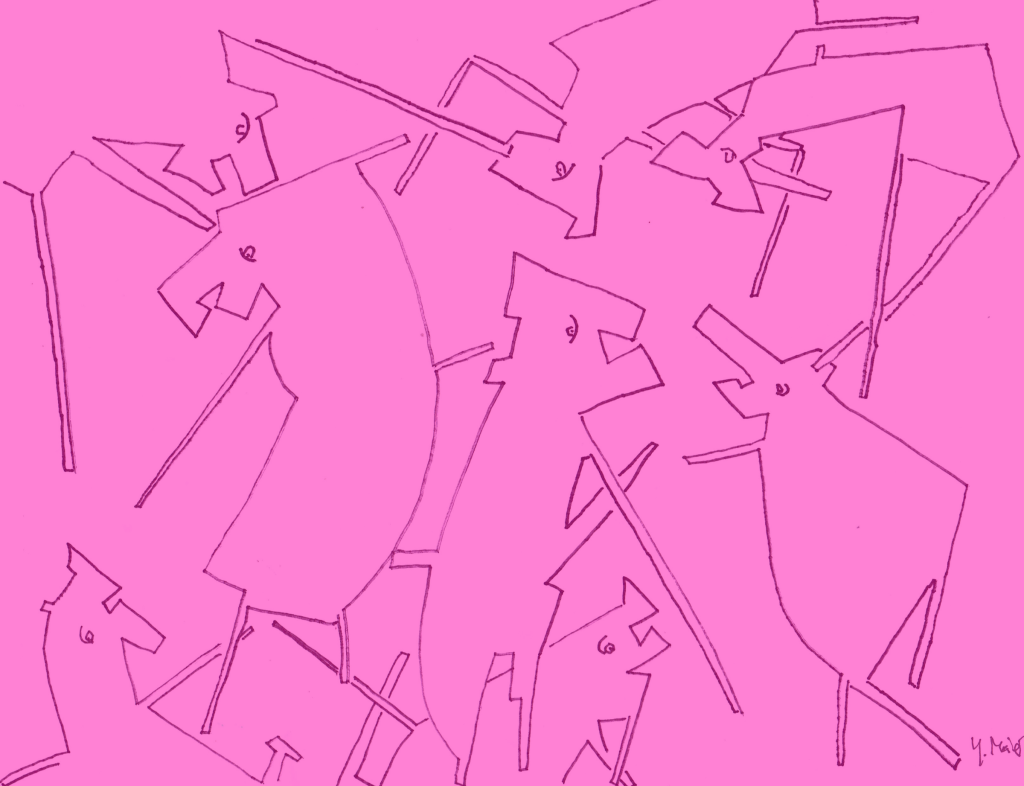This issue offers invitations: dock with us to explore the tectonics of somatic imaginations. Fly with synesthetic energies, grounded in delicious sensory embodiment. Enjoy as the genres mix and flail in hyperdrive. Our travel themes twine around the cyber avatar, spaceship architectures, steampunk air messages from the multiverse.
To assemble this flight crew, we asked poets, writers, visual and performance artists to bring us their smooth or rough, edgy, connected, recombinant or disjointed glimpses of different heterotopias: from Sun Ra’s funk to global futurisms, from crip fabulation to Afro-pessimism, from solarpunk to trans bots.
We did not know what to expect, but we were again and again delighted, as new energies accumulated among the pieces that came in: surprising universes speaking toward one another, new conversations and alignments, all expanding beyond our own conjoined orbits.
Our contributors respond with glimpses of speculative embodiment, on the edges of human and non-human others, tender, precarious, soaring among trees and dissolving among worms—for instance, in poems by Alexis Pauline Gumbs and CA Conrad, and in Charli Brissey’s videodance, which will be published in an online folio that serves as a digital companion to this issue (available at michiganquarterlyreview.com). Boundaries break, gallop into the open, with leaky edges and tight sutures in poems by Ginger Ko, Megan Kaminski, and Cynthia Ling Lee (“microclimates formed between body and rock”).
Nic Anstell responds with a story of an artificial intelligence traveling the cosmos and approaching emotions through the accumulation of human languages. Leanne Ogasawara writes of a precious book, The Orchid, its transmission and proliferation, of the Chinese Emperor’s collection and centralization, all while traveling through space and far into the future.
What is solid, bound, becomes defamiliarized and opens into the liminal—Tonya Foster writes, “Earth is, after all, a planetary / constellation pressing past our / cautiously corralling calculations.” Will Alexander reaches toward the cosmos in a related jubilation: the cosmos is “not some falsely posited linearity but a form of optical occultation not as unalterable dimension of itself but as extended parallel that dazzles with its own ridding, with its differing equations of beauty.” And the cosmic, the expansive field, sends its glimmering fragments right back to senses of being embodied, enminded, as heidi andrea restrepo rhodes writes in their ode to the neuroqueer universe, “To the scattering and the stuttering. // O particles, O poets. O marigolds & bears. / O Jupiter, O hyphae telephoning in the soil.” In the online folio, Gabrielle Civil also calls on the planet Jupiter, on time travel, and on the dis/connect of COVID Zoom performances to create a Black feminist somatic ritual.
Visual artists offered us new vistas of alignments. Bishakh Som’s graphic imagination offers an architecture of chemical/plant connectivities, pods and electricities, seeding flesh. Yvonne Meier’s cover image asks you, reader, as you touch this issue to join in a raucous dance improvisation: here are entities, open and joyful, shifting across the bound book.
These are some of the registers of this collection: an urgent exploration beyond the familiar, but grounding itself again and again in the somatic, the felt, the elation and desperation of chemical endocrinal sensations. “As above so below”—these alchemical mystical thoughts play through us as we read these fractal assemblages and what they offer us to think with: echoes, sonar pings, and glitter reflections.
In many of these contributions, a COVID-era loneliness and a deep awareness of social injustice drives a reach toward connection, always deferred, fingertips gliding past and through one another. Megan Milks writes about reading Maurice Sendak’s In the Night Kitchen as a queer ur-text, a psychoanalytic engagement with childhood development that offered new articulations of homosociality and nurturing to Megan’s young readerly eagerness. Tim Jones-Yelvington offers a hero’s journey of strawberry Fanta and sex with a good friend: “If our planets are squalid, we’re squared, lovers, playing foolish games, going door to door to get out the touch.” Teresa Carmody counters violation and sexual harassment in literary spaces with amulets of feminist embedment, evocative spells from fellow writers and thinkers.
We begin to feel this issue is less a curation than an activation of community. In this reach, in art-making and in living artful lives, we find allegiances, we make a world in which we can live.
To read the rest of the Spring 2023 SomaFlights issue, you can purchase it here.





